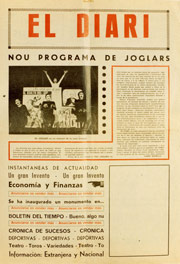


Premiere the 18th january 1968 at Teatro Principal de Zaragoza (Zaragoza).
Shown until the 18th july 1970.
Those formulae that paved the way and popularised the emergence of mime from the oblivion in which it had been languishing today seem outdated. The so-called ‘classic’ mime with its butterflies, puppet imitations, oriental stories, adventures and misfortunes of fixed characters, etc., lead to a closed circle of repetitions that condemn mime to the use of stereotypical clichés that bind it and prevent any possible evolution.
Since the creation of Els Joglars in 1962, the company has been driven by a constant urge to renovate and discover all the possibilities and limitations of mime. Above all, we have tried to do in six years what mime has taken thirty years to do in the rest of Europe, with the aim of putting our group on a par with the best international mime groups, while always ensuring that we maintain the characteristics of our southern personality. This excitement is made very clear in our participation in international festivals where at present the accent is very much on working without limits and ‘airing’ all the tradtionalisms, for the public must continually receive diverse impressions through pantomime.
Faced with this need there appears a fascinating question: at the moment of renovating and extending our means of expression and exploring the diverse characteristics we have, does mime not become limiting? I believe that the question can not be answered until a certain time has passed and we can observe the results; meanwhile, we continue to direct our work through the field of research, basing our work essentially on the productions staged to date, but at the same time jettisoning all the technical exhibitionism and ‘preciousness’: a truly collective task, both of production and interpretation is the hallmark of the production we present today. The elimination of the personal number represents the breaking with a veritable institution amongst the mime companies.
El diari falls into the experimental field described above, given that we make use of the voice, objects, the set and, above all, we have conferred on the work a rhythm of continuity of time, rejecting in this way the traditional scene changes that only serve to cool the attention of the audience.
By means of a style that is often grotesque and a rhythm that is lively and dynamic, and ever faster, El diarisets out to reproduce in the form of a pantomime the past, present and perhaps the future of the world that surrounds us, through the staged vision of the news of an ordinary newspaper. Those formulae that paved the way and popularised the emergence of mime from the oblivion in which it had been languishing today seem outdated. The so-called ‘classic’ mime with its butterflies, puppet imitations, oriental stories, adventures and misfortunes of fixed characters, etc., lead to a closed circle of repetitions that condemn mime to the use of stereotypical clichés that bind it and prevent any possible evolution.
Albert Boadella
Albert BOADELLA
Jordi CARALT
Esperança FONTÀ
Glòria ROGNONI
Enric ROIG
Montserrat TORRES
Enric VIDAL
Director: Albert BOADELLA
Stage decoration: Robert LLIMÓS
Propierties: Montserrat TORRES
Sound: Marta CATALÀ
Sound effects: Enric ROIG
Destino. S. Gash
Aún corriendo el riesgo de caer en el tópico, afirmaremos sin ambages que El
Diari es sensacional, con todo lo que esta palabra pueda implicar de sabiduría e
inspiración, de imaginación creadora y de ingenio, y, sobre todo, de renovación
de un género que ya no era capaz de sustraerse a convenciones tiránicas.
Diario de Barcelona
El Diari pone de relieve un extraordinario sentido del humor, un poder de
síntesis verdaderamente importante y una intencionalidad de líneas claras,
aunque algunas de las ideas expuestas rocen límites peligrosos.
El resultado final es sorprendente, y la exposición de toda esa “lectura”
mantiene en vilo al espectador, pendiente de cuanto ocurre en la escena, y que
encierra en varios puntos hallazgos de gran fuerza.
Destino. Frederic Roda
En El Diari los límites hablados de un teatro realista son rebasados mediante el
silencio. Silencios realmente expresivos, manifestaciones de las cosas que no se
dicen por imposibilidad interior y exterior del lenguaje hablado. Y todo ello
realizado con imaginación, con fuerza de juego, sin pedantería. Un espectáculo
sencillo y tonificante.
Hoja del Lunes. Salvador Corbero
El Diari causó impacto y sorpresa en el Teatro Español de Madrid, y en su
honor y en el de los siete componentes del grupo que dirige Alberto Boadella,
sonaron cálidos, entusiastas, largos aplausos en las tres representaciones que
ofrecieron.